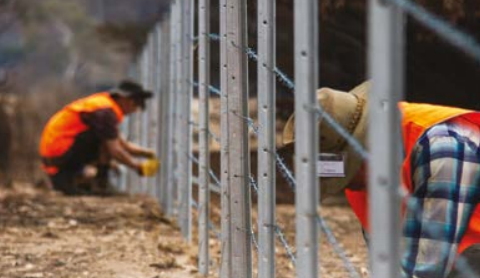Greenham cattle supplier, Barry Hollonds of Sale, Gippsland, topped the eating quality stakes at the 2021 Beef Australia Carcase Competition.
Snapshot
| Property | Henley Park |
| Area | 100ha |
| Enterprise | Fattening cattle for the NEVER EVER program |
| Livestock | 200 head, predominantly Angus steers |
| Pasture | clover and ryegrass |
| Soil | dark brown loam and some red soil |
| Rainfall | 600mm/year |
Key points
• Barry Hollonds won the Meat Standards Australia (MSA) Index Award (individual carcase with the highest MSA Index from classes 1-7) at the national 2021 Beef Australia Carcase Competition
• The winning carcase had a HSCW of 251.2kg an MSA Index of 68.95, placing it in the top 1% of cattle in Australia
• Barry aims to buy cattle from known vendors with a history temperament and superior eating quality outcomes
• A gradual shift to a predominant Angus herd with consistent genetics has increased MSA compliance and halved the length of Barry’s finishing program, increasing annual turn-off
• Purchase of irrigated land has helped close the summer feed gap.
Barry won the MSA Index Award (individual carcase with the highest MSA Index from classes 1-7) at the 2021 Beef Australia Carcase Competition from a pool of 259 entries and 777 head. The winning carcase had a HSCW of 251.2kg and an MSA Index of 68.95, placing it in the top 1% of MSA cattle in Australia.
Barry also placed sixth in Class 2: pasture fed – pen of three heavy trade chiller steers or heifers (260.1-340kg), and fifth in Class 3: pasture fed – pen of three export chiller bullocks (300-420kg).
Winners were announced at a Beef Australia awards dinner in Rockhampton in May.
“I was very excited to win. I nearly fell over when they called my name,” Barry joked.
“Seeing my MSA feedback encouraged me to enter the carcase competition as I could see the quality I was producing and I wanted to see how I compared to the best.”
Changing tack to increase productivity
A NEVER EVER accredited Greenham supplier, Barry runs a herd of 200 predominantly Angus steers fattened on pasture and turned off to the Greenham Moe processing facility, targeting live weights of about 600-650kg.
Located in the Macalister Irrigation District in East Gippsland, 70% of Barry’s 100ha property is under irrigation with the rest dryland paddocks.
“We don’t subsidise feed at all. We just rely on good quality pasture,” he said.
Cattle are sourced from south-east Victoria at around 14-18 months old and about 450- 500kg.
“I follow particular bloodlines and get to know my breeders,” he said.
Purchasing cattle with consistent genetics, and securing irrigated land to close the summer feed gap and maintain steer condition year-round has enabled Barry to shorten his finishing program from about 13-14 months five years ago to now turning off cattle after around six months.
Cattle are rotationally grazed and run in mobs of 15-20 and moved onto fresh pastures every two to three days.
Low stress handling secret to top eating quality
Quiet cattle are the cornerstone of Barry’s approach to producing superior eating quality beef.
“I regularly walk around my farm among the cattle so they get used to me interacting with them and settle down a lot easier,” he said. And it shows.
Over the past year, Barry has achieved an average MSA compliance of 100% and an average MSA Index of 63.34.
The minimum specifications for compliance to MSA, which is a requirement of the NEVER EVER program, are an ultimate pH of 5.70 or below and a minimum of 3mm rib fat.
Beef eating quality can be negatively impacted by high pH resulting from losses in muscle glycogen (blood sugar), which is predominantly caused by stress and inadequate nutrition in the lead up to slaughter.
To best prepare cattle for the stressors of consignment MSA recommends cattle are managed as a single mob for at least 14 days, and are gaining at least 0.8kg/day for the 30 days prior to consignment.
This is not the first time Barry has been recognised for his commitment to quality beef. In 2019 he placed 35th in the MSA Excellence in Eating Quality Awards Top 100 producers in Victoria.
“Eating quality and compliance to MSA is the key to keep consumers coming back and securing the extra dollars for Aussie beef,” Barry said.
“It’s no different to any other product – if you produce a poor product, people aren’t going to come back, but if we focus on consistently producing the best article we can, we will only increase demand for our beef.”













